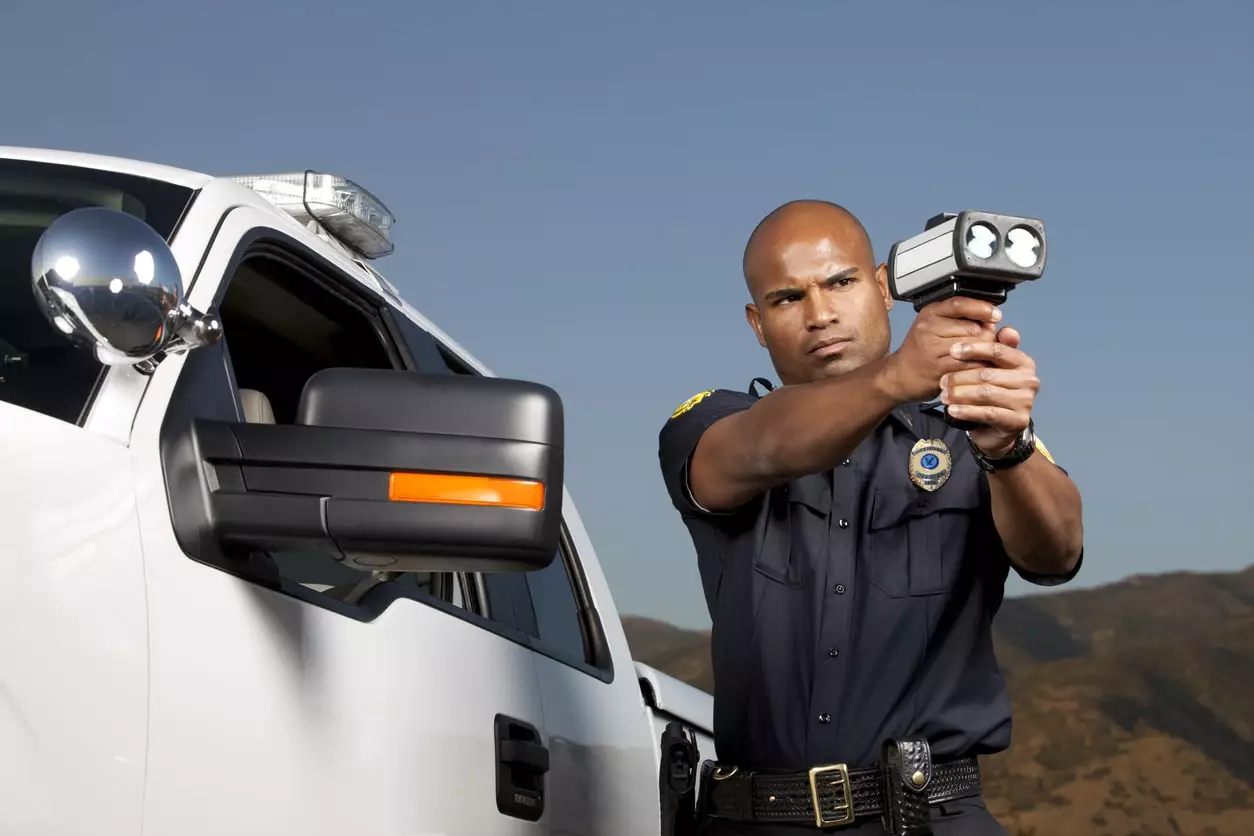 What Is a License Plate Reader and Can Police Track You Using It?
What Is a License Plate Reader and Can Police Track You Using It?
Table of Contents
- Virginia License Plate
- Virginia License Plate Design and Formats
- Virginia Vanity License Plate
- Most Popular Virginia Special Plate Numbers
- Virginia License Plate Lookup
- What Do I Need to Get a License Plate in Virginia?
- Differences Between a Passenger License Plate and a Commercial License Plate in Virginia
- How To Renew License Plate in Virginia
- How To Transfer a License Plate in Virginia
- Virginia License Plate Lookup Frequently Asked Questions (FAQ)
 Virginia License Plate
Virginia License Plate
A Virginia license plate is an identification plate that is mounted on the front or rear of a vehicle, displaying a unique combination of letters and numbers that is unique to the vehicle and its owner. Per the Code of Virginia, all vehicles operating on the highways of the Commonwealth must acquire license plates, except for those used for delivering the United States mails. The Virginia Department of Motor Vehicles is authorized to issue license plates for passenger vehicles, trailers, semi-trailers, taxicabs, mopeds, motorcycles, military vehicles, and low-speed vehicles.
Currently, the Virginia DMV issues license plates in the following categories:
- Standard License Plates: In the Commonwealth, these license plates are the most common ones and are typically provided when a new vehicle is purchased, a specialty license plate is returned, or a lost or stolen license plate is replaced
- Specialized License Plates: these are issued to individuals who intend to support environmental causes, showcase their affiliations or personal interests. Proof of membership may be necessary to obtain these plates
- Personalized License Plates: these are issued to individuals who feel the need to enhance their personal branding or showcase their creativity through custom messages, with a unique combination of numbers and letters chosen by the owner
- Business Logo Special License Plates: these are issued by the Virginia DMV to eligible business owners who are interested in advertising their company and making it stand out by numbering each vehicle in their fleet or displaying a message that describes their business
- Clean Special Fuel License Plates: these are issued to individuals who use clean special fuel exclusively for their vehicles. The process of issuing these plates requires a thorough review of applications and documentation to determine a vehicle's eligibility
- Revenue-sharing License Plates: these are issued to individuals who aim to show their support for an organization through charitable means. The funds raised from the sale of these plates are used by the supported organization to finance their operations and programs
- Disabled Parking Placard or License Plates: in Virginia, persons with disabilities can apply for permanent or temporary disability parking license plates by including certifications of disability from their chiropractors, podiatrists, physicians, physician assistants, or nurse practitioners
In Virginia, motorcycles, tractors, semi-trailers, trailers, autocycles, and motor vehicle dealers are issued single license plates that should be affixed to the rear of these vehicles. On the contrary, other vehicles must obtain two license plates, with one to be displayed on the rear and the other on the front. Besides the unique alphanumeric combinations, a typical Virginia license plate has its revalidation stickers positioned on the upper left and right corners. The top section of the license plate bears the word "VIRGINIA", while the bottom section features the state's travel and tourism slogan, "Virginia is for lovers", accompanied by the official tourism website.
 Virginia License Plate Design and Formats
Virginia License Plate Design and Formats
Virginia license plates are rectangle-shaped and can contain up to seven characters. The standard license plates issued to motor vehicles display between six and seven characters. Usually, they are written in dark blue and embossed on a white background, with a hyphen separating them. Also, the standard plates of motorcycles are allowed to have up to six numbers with no letters.
Virginia specialized license plates come in a wide range of designs and can accommodate up to six characters for standard sizes and five characters for motorcycle sizes. Logos are typically situated on either the left or right side of the characters, with slogans featured at the bottom of the license plates.
Photos of standard license plates issued to motor vehicles in Virginia:
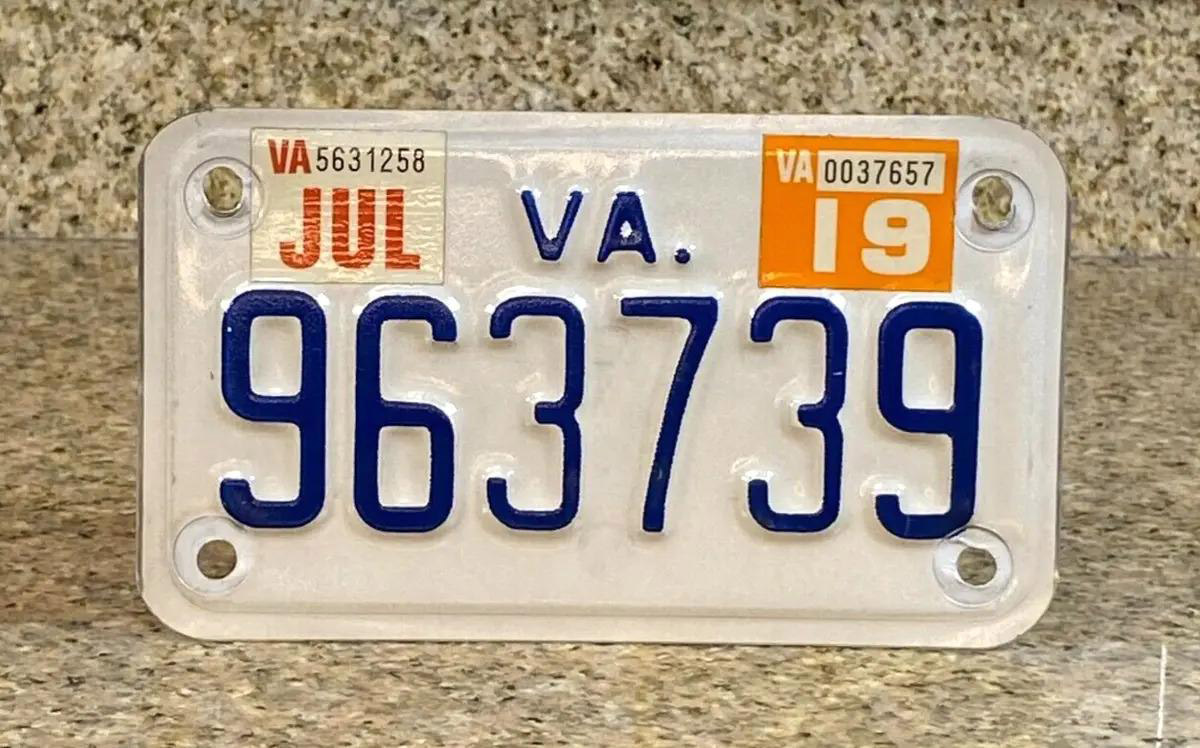
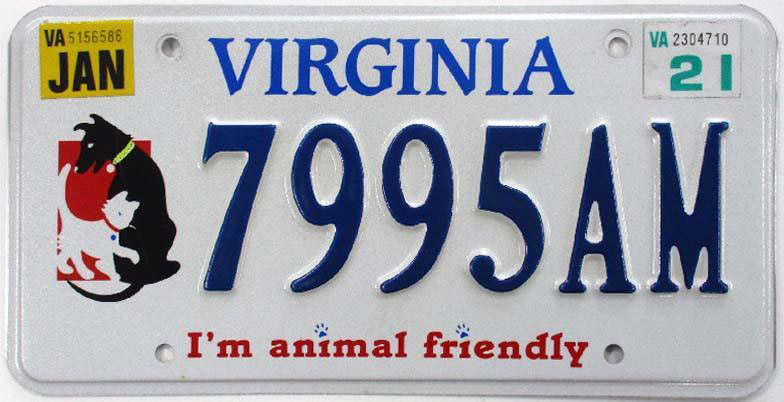
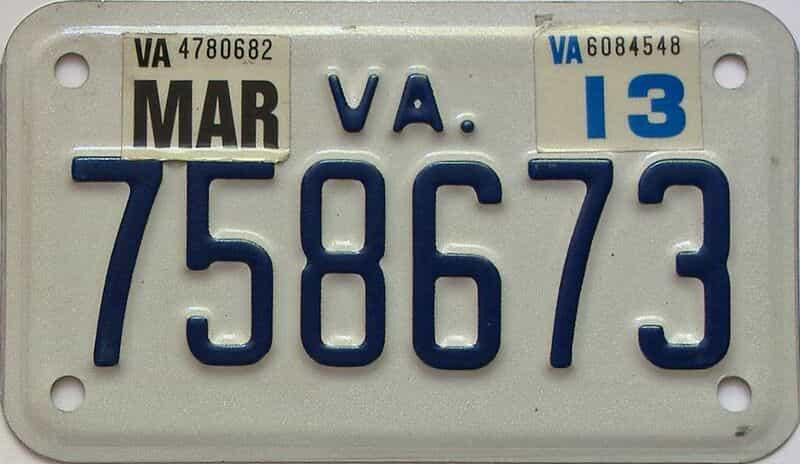
Specialized license plates issued to motor vehicles in Virginia:
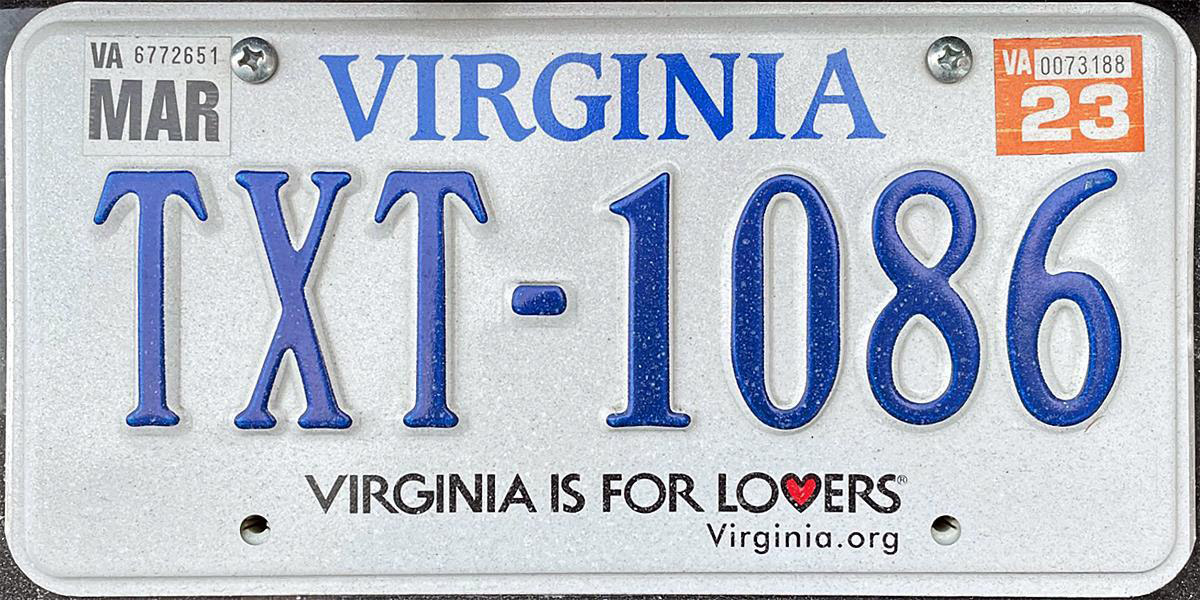
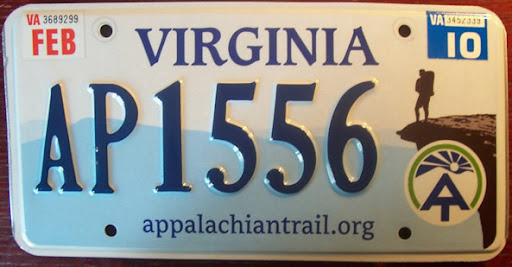
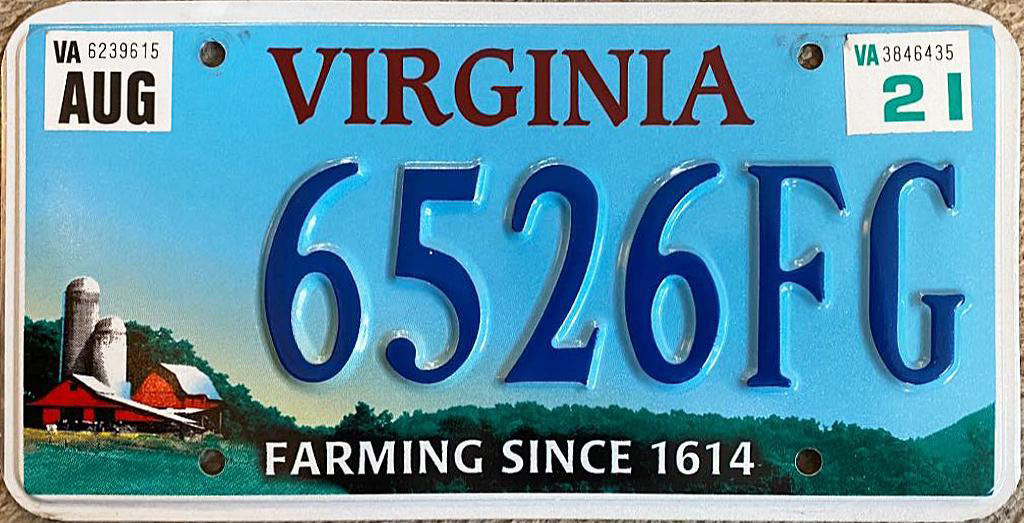
 Virginia Vanity License Plate
Virginia Vanity License Plate
Vanity license plates are customized license plates that feature special arrangements of letters and numbers selected by vehicle owners to showcase their interests, beliefs, personalities, or hobbies. The Virginia DMV issues more than 200 specialized license plates and allows vehicle owners to create their unique, personalized texts. These license plates cost between $10 and $25, in addition to a $10 fee for personalization, and are usually mailed to their buyers within 6 weeks.
Prior to obtaining personalized license plates in Virginia, it is essential to study the personalized plate guidelines and restrictions outlined on the Virginia DMV website to ensure compliance with the policy governing the issuance of these plates. Failure to adhere to these guidelines may result in the disapproval or recall of the license plates.
Additionally, vehicle owners may personalize their specialized license plates by visiting the Virginia DMV website and selecting from the wide range of custom plates. To check the availability of a personalized text, vehicle owners must select their desired license plate type and input their chosen personalized character combinations. A preview of the license plate will be automatically provided on the screen if the personalized text is available. Vehicle owners can reserve their license plates for up to 90 days or purchase them immediately.
 Most Popular Virginia Special Plate Numbers
Most Popular Virginia Special Plate Numbers
The most common themes of personalized and specialized license plate numbers in Virginia are:
- 173rd Airborne license plates
- AFL-CIO license plates
- Air Medal license plates
- Alpha Kappa Alpha Sorority license plates
- Alpha Phi Alpha license plates
- Alzheimer's Association license plates
- Amateur Radio license plates
- American National University license plates
- Animal-friendly license plates
- Don't Tread On Me license plates
 Virginia License Plate Lookup
Virginia License Plate Lookup
License plate lookup involves the use of a vehicle's license plate number to find out key information about it. The key information you can find about a vehicle includes the make and model year, vehicle type, odometer reading, maintenance history, and recalls. The most common reasons for running a license plate lookup in Virginia include:
- To gather basic or extensive information before purchasing a vehicle, such as the salvage title report and vehicle history
- For investigative purposes by authorized law enforcement agencies
- For research and towing purposes
To obtain vehicle records from the Virginia DMV, eligible requesters are required to provide certificates of title, vehicle identification numbers, and vehicle verification numbers (VIN). Furthermore, they can obtain their motor vehicle records by either applying online or sending a completed information request (form CRD-93) by mail, along with the appropriate fees, to the following address:
Virginia Department of Motor VehiclesAttention: Vehicle (Driver) Records Work Center
P. O. Box 27412
Richmond, VA 23269
Alternatively, Recordsfinder and similar third-party websites provide basic vehicle details, like the vehicle's make and model, when conducting a license plate lookup. These sites usually charge a fee in order to access more comprehensive information.
Virginia Reverse License Plate Number Search
A reverse license plate search functions similarly to a license plate lookup. Both services grant access to vehicle-related information by searching with a vehicle's license plate number. Several websites provide reverse license plate number search services. An example is Recordsfinder, a registered website that facilitates a quick search process through simple steps. It is essential to ensure that your search complies with federal and state regulations in order for your request to be processed successfully.
 What Do I Need to Get a License Plate in Virginia?
What Do I Need to Get a License Plate in Virginia?
To acquire license plates in Virginia, a vehicle owner who is a resident of Virginia must complete the state's vehicle registration process. Hence, it is important to fulfill the following requirements in order to be issued license plates:
- Obtain a vehicle title
- Complete a vehicle registration application (VSA 14)
- Pass an emission inspection (if applicable)
- Meet the minimum insurance coverage requirement or pay the uninsured motor vehicle fee
Upon fulfilling all necessary requirements, a vehicle owner can personally submit a duly completed vehicle registration application (VSA14), the necessary documentation, and the applicable registration fee to the Virginia DMV. This can be done at any DMV mobile office, DMV select, or customer service center. Alternatively, the documentation can be sent by mail to the address below:
Virginia Department of Motor VehiclesAttn: Titling Department
P.O. Box 27412
Richmond, VA 23269-0001
Furthermore, a vehicle owner who has just moved to Virginia can register their vehicle, subsequently obtaining their license plates by fulfilling the following requirements:
- Apply for a Virginia driver's license
- Complete and submit the application for title and registration (VSA17A)
- Pass an emission test (if applicable)
- Acquire a vehicle safety inspection sticker
- Have a signed bill of sale from both the buyer and seller
- Obtain a proof of Virginia residence
- Obtain proof of insurance
- Pay the registration fees
Upon completing the registration process, the Virginia DMV will mail the registration documents, license plates, registration stickers, and registration card to the vehicle owner.
 Differences Between a Passenger License Plate and a Commercial License Plate in Virginia
Differences Between a Passenger License Plate and a Commercial License Plate in Virginia
A passenger license plate is issued to a vehicle used for personal commuting, intended to carry lighter loads, and with a smaller passenger capacity. On the contrary, a commercial license plate is issued to a vehicle used for the transportation of goods and services, and it is often larger and heavier than a standard passenger vehicle. In Virginia, a passenger vehicle is used for personal commuting and does not carry more than 10 people. The Virginia DMV issues a commercial license plate to any vehicle that meets the following specific requirements:
- It is designed to transport 16 or more passengers, including the driver
- It is a combination of vehicles with a gross combination weight rating of 26,001lbs or more if the towed vehicle has a gross vehicle weight rating of more than 10,000 lbs
- It is a single vehicle with a gross vehicle weight rating of more than 26,001 lbs
- Irrespective of its size, it is used for transporting hazardous materials, and it requires federal placarding
Here are the key differences between a passenger and commercial license plate in Virginia:
| Features | Passenger License Plate | Commercial License Plate |
|---|---|---|
| Vehicle Use |
|
|
| Plate Number Arrangement |
|
|
| Requirements for obtaining |
|
* requirements may vary slightly depending on whether the vehicle is used for interstate or intrastate commerce |
 How To Renew License Plate in Virginia
How To Renew License Plate in Virginia
In Virginia, vehicle registration renewal is handled by the Virginia DMV and it may be completed annually, biennially, or triennially based on the preference and eligibility status of the vehicle owner. In order to ensure timely renewal, the Department will send a renewal notice, either by mail or text, 30 days prior to the expiration of your current registration. Alternatively, a mail renewal reminder will be sent to your current address 90 days before your vehicle registration expires.
Vehicle registration renewal can be carried out online by visiting the Virginia DMV website. To successfully complete the renewal process, you can log in to your MyDMV account using your social security number or DMV customer number or, alternatively, by entering your title number along with the last four digits of your VIN.
In-person renewals can be done by visiting any Virginia DMV Select Office or DMV Customer Service Center; this is usually an option for vehicle owners who have a problem renewing their vehicle registration online, have outstanding fees, or require an emission inspection. It is important to visit the DMV with the following documentation:
- Proof of emission test (if applicable)
- Renewal notice or current registration
- Proof of insurance
- Driver's license
- Applicable fees
To renew your vehicle registration by mail, you must complete the registration renewal form (VSA 14) and include a check or money order for the applicable fee to be sent to the address below:
Virginia Department of Motor VehiclesAttn: Renewal Center
P.O. Box 27412
Richmond, VA 23269-0001
The Virginia DMV provides a fee chart that enables vehicle registrants to determine the applicable fees for their vehicle registration renewal. These fees are determined by factors such as the weight, type, and emission inspection of the vehicle, as well as whether the owner possesses a special license plate. Usually, registration materials, including license plates, are sent to vehicle registrants within 5-15 days after renewal.
 How To Transfer a License Plate in Virginia
How To Transfer a License Plate in Virginia
To transfer your license plate from an old to a new vehicle, you can visit any Virginia DMV Customer Service Center with a completed license plate application (VSA 10). A license plate transfer is possible under the following conditions:
- Both vehicles have the same weight and design (this attracts a $2 fee)
- The new vehicle weighs more than the old vehicle (this attracts a $2 fee plus a prorated fee for the difference in weight)
- The new vehicle weighs less than the old vehicle (this attracts a $2 fee with no refund for the difference in weight)
 Virginia License Plate Lookup Frequently Asked Questions (FAQ)
Virginia License Plate Lookup Frequently Asked Questions (FAQ)
Can I Get a Replacement for My Lost License Plate in Virginia?
In Virginia, you can replace a lost license plate by visiting any Virginia DMV Customer Service Center in person with a filled out Vehicle Registration Application (VSA 14) and the necessary fee. The replacement of a license plate will incur a charge of $10, while a decal replacement will cost $1. The replacement of permanent or trailer license plates cost $5.
What Do Police See When They Run Your License Plates in Virginia?
Law enforcement agencies like the police may acquire a range of information when they run your license plate. These include:
- Vehicle description, such as the make, model, and VIN
- Vehicle registration status; if current, suspended, or expired
- Vehicle history, such as the odometer reading, ownership changes
- Traffic violation
- Lien records
What is the Penalty for Driving with An Expired License Plate in Virginia?
In Virginia, vehicle owners must renew their vehicle registration annually, biennially, or triennially, depending on their eligibility and chosen renewal interval. As outlined in section 46.2-646 of the Code of Virginia, vehicle owners with expired registration are granted a grace period of four months before facing potential fines or having their vehicle impounded by law enforcement.
Do I Need to Return License Plates in Virginia?
It is necessary to return your license plate to the Virginia DMV if you have sold, traded, or discontinued the use of your vehicle. To surrender your license plates permanently, you have the option to drop them off at a DMV Customer Service Center or report the surrender online through the DMV's Online Plate Surrender. Alternatively, you can complete a Vehicle Registration Refund Application (form FMS 210) and mail it, together with the license plate, to the designated address:
Virginia Department of Motor Vehicles2300 West Broad St
Richmond, VA 23269
Can I Keep my Virginia License Plate if I Move to Another State?
No, it is not permissible under Virginia law to retain your license plates upon moving out of the Commonwealth. You must surrender the plates permanently in person, online, or by mail to prevent fraudulent use and encourage recycling efforts. Additionally, informing the Commissioner of the Revenue or Director of Finance in your current locality is essential to prevent continuous access to personal property tax on your vehicle.
What Size Are License Plates in Virginia?
The sizes of the license plates issued by the Virginia DMV are:
- License plates issued for passenger vehicles, trailers, trucks, and semi-trailers are "12 x 6"
- License plates issued for motorcycles and mopeds are "7 x 4"
How Long Can You Drive with Temporary License Plates in Virginia?
The Virginia Department of Motor Vehicles has the authority to issue a trip permit to vehicle owners who require transportation of an unregistered vehicle from one place to another. A Virginia resident who owns a trailer, truck, or any other unregistered motor vehicle can obtain a standard trip permit online or in-person at any DMV Customer Service Center. This permit remains valid for a duration of three consecutive days. To obtain a standard trip permit, the vehicle owner must provide these application requirements, which are:
- Dates of travel
- Insurance certification or an uninsured motor vehicle fee of $41.67
- Point of origin and point of destination
- $5 permit fee
Similarly, a resident of Virginia who plans to purchase an unregistered vehicle to be titled and registered in the state can request a prospective purchaser's trip permit. This permit is valid for three consecutive days and can be obtained either online or by visiting a DMV Customer Service Center. To obtain this permit, the prospective buyer must provide these application requirements:
- $5 permit fee
- Point of origin and point of destination
- Vehicle description, including year and make of the vehicle
- Insurance certification or an uninsured motor vehicle fee of $41.67
- Original bill of sale
The Virginia DMV allows a prospective vehicle buyer to repurchase the prospective purchaser's permit if they do not buy the vehicle within 15 days after the first permit. Furthermore, Virginia dealers are permitted to issue temporary license plates that are valid for 30 days until permanent license plates are issued.
What Are the Steps to Renew License Plates in Virginia?
You can renew your license plates in Virginia by taking the following steps:
- Determine your renewal date. The Virginia DMV will send you a renewal reminder either by mail, text or email up to 90 days before the expiration of your vehicle registration
- Pass the emission inspection (if applicable)
- Gather the necessary documents and determine your applicable fee
- Renew your license plates online, by mail, or by visiting the DMV Select offices
- Receive your registration details, license plates, and registration card
What Do I Do if My License Plate is Lost or Stolen in Virginia?
If you lose your license plates or they were stolen, you can order a replacement from the Virginia DMV by following these steps:
- Contact law enforcement and obtain a police report
- Inform the DMV about it and request a replacement in person by visiting any DMV Customer Service Center
- Complete the vehicle registration application
- Pay the applicable fee, depending on the vehicle type




